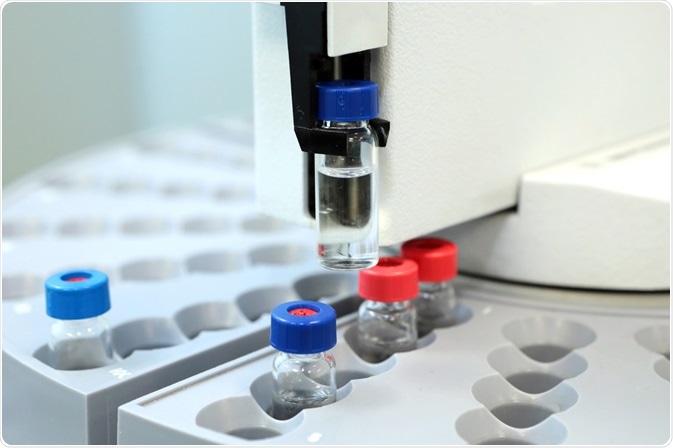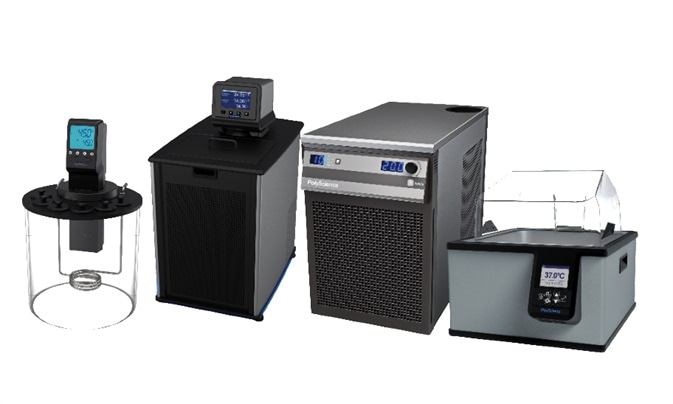High performance liquid chromatography (HPLC) and, more recently, ultra-high-performance liquid chromatography (UHPLC) are mainstay separation techniques. This is especially true for pharmaceutical, medical, food and industrial research where good separation is linked to the efficiency of the mass spectrometry used in detection and identification of components of interest.

Image credit: Cergios/Shutterstock.com
When UHPLC or UPLC systems were first introduced, it was thought that sub 2µm particles (usually around 1.7µm for optimum column efficiency), would improve speed, sensitivity and resolution taking full advantage of established chromatographic principles. UHPLC provides separations using 1-2mm diameter columns packed with smaller particles and with higher flow rates. The benefits associated with UHPLC over conventional, include:
- Reduced solvent consumption
- Reduced analysis time
- Increased sensitivity, improving the selectivity and dynamic range of LC
Temperature Control
The reliability and repeatability of chromatographic separations (retention times and diffusion effects) does, however, rely upon effective temperature control. HPLC columns operate at ambient temperatures of around 30°C, while UHPLC columns operate at 65°C. In UHPLC the use of smaller particles means higher pressures with an attendant increase in viscous frictional heating of mobile phase. Proper temperature control is essential in three areas:
- Pressures of up to 15,000 psi mean that friction between column and mobile phase generates high amounts of viscous heat and temperature increase inside the column
- Mobile phase pre-heating prior to entering the column to reduce its viscosity under high pressure
- Post-column mobile phase cooling prior to entering the detector
Without proper column thermostating, radial temperature gradients can be formed within the column and have an effect on the separation efficiency (theoretical number of plates, N) as well as analyte retention. It is believed that in isocratic reversed-phase LC there is a reduction of 1-2% in retention time for every 1°C rise in column temperature.
Of course, this is not the same for all compounds but variation of the column temperature can change peak spacing or elution order and cause peak broadening or peak distortion. Poor mobile phase and column temperature control can lead to artefact ghost peaks, increased baseline noise and bubbles of vapour going through the detector. It is also very important to cool post-column eluted mobile phase to prevent diffusion in the eluant in the detector flow-cell and allow a suitable backpressure for the detector.
Effect on Results
Chromatographic separations rely upon repeatability under the same conditions. Heating is one of the most difficult parameters to control and can cause significant variation in elution order and resolution. Chromatographers develop methods for each system they analyse and these have to be both transferable and repeatable to other labs. Heat control methods are critical.
Any researchers working on smaller biological samples such as DNA or peptides using UHPLC will be aware of the need for reliable heating and thermostatic control. For example, the development of an internal standard for a gradient UHPLC-MS/MS method to analyse biological neurotransmitters would be doomed to failure without effective temperature control. Thermostatic gradients are used in some separations but they have to be carefully controlled using oven, bath or cooler to provide reproducible results. PolyScience can provide advice upon this issue.
UHPLC at Pittcon 2019
An Pittcon 2019, UHPLC and temperature control was a topic of major interest. There has also been increased interest in using temperature gradients in LC separations, but these need to be very well controlled using thermal management and thermal sensors. The Waters symposium at Pittcon 2020 examined the origins of UHPLC and the advances in LC instrumentation over the past twenty years with input from experts such as Jorgenson, Bouvier, Barber and Carr.
Part of the symposium examined viscous frictional heating and how to promote efficient heat dissipation and also the trade-off between heating mobile phase and temperature controlling the column. There was also input on UHPLC column development, the development of ultra-stable stationary phases for 2D-UHPLC and finally an insight into how the pharmaceutical industry has adopted UHPLC in pharmaceutical R&D to save time and provide economy in solvent use to support environmental concerns.
Effective Temperature Control
Pittcon 2019 played host to PolyScience who are experts in the field of heat, cooling and temperature control for laboratory analysis equipment. PolyScience were able to advise how using their new DuraChill and 6000 series recirculating chillers provides temperature control for chromatography columns.
The new DuraChill Chillers and 6000 series recirculating chillers are designed to achieve high heat removal in demanding environments. These systems can provide robust and reliable temperature control for closed, external systems such as chromatography columns or even medical diagnostic equipment. The chillers are also versatile and suitable for most applications with a number of helpful options and accessories.

Image credit: PolyScience
At the Pittcon 2019 Expo (March 17 - 21, Pennsylvania Convention Center) PolyScience experts were available at Booth #2951 to provide advice and demonstrations of their range of thermal control equipment.
References
- Cielecka-Piontek, Judyta et al. “UHPLC: The Greening Face of Liquid Chromatography” Chromatographia vol. 76,21-22 (2013): 1429-1437
- Grinias, James P et al. “Repeatability of gradient ultrahigh pressure liquid chromatography-tandem mass spectrometry methods in instrument-controlled thermal environments” Journal of chromatography. A vol. 1461 (2016): 42-50
- E Grushka and N Grinberg Eds, Advances in Chromatography, Vol 44, T&F, 2005
- M. Taleuzzaman et al,. Ultra Performance Liquid Chromatography (UPLC) - A Review, Austin J Anal Pharm Chem. 2015; 2(6): 1056
- Van Deemter JJ, Zuiderweg EJ, Klinkenberg A. Longitudinal diffusion and resistance to mass transfer as causes of non ideality in chromatography. Chem. Eng. Sci. 1956; 5: 271-289
About Polyscience

PolyScience was started in 1963. They pioneered innovations ranging from the first zero-switching circulators to the first refrigeration systems for DNA amplification to an award-winning line of culinary products.
Sponsored Content Policy: News-Medical.net publishes articles and related content that may be derived from sources where we have existing commercial relationships, provided such content adds value to the core editorial ethos of News-Medical.Net which is to educate and inform site visitors interested in medical research, science, medical devices and treatments.